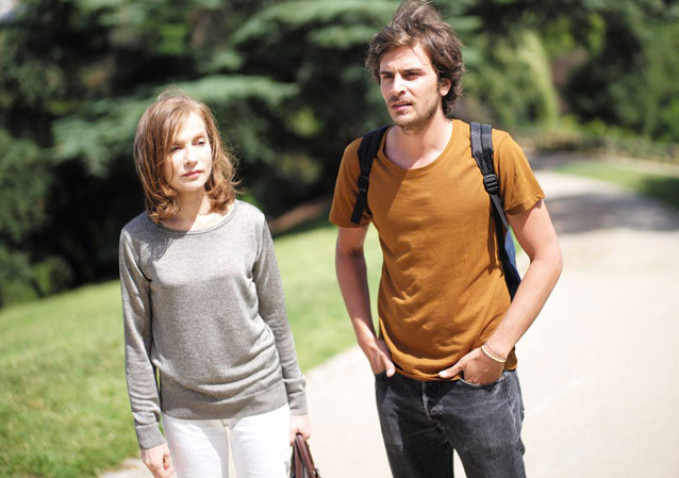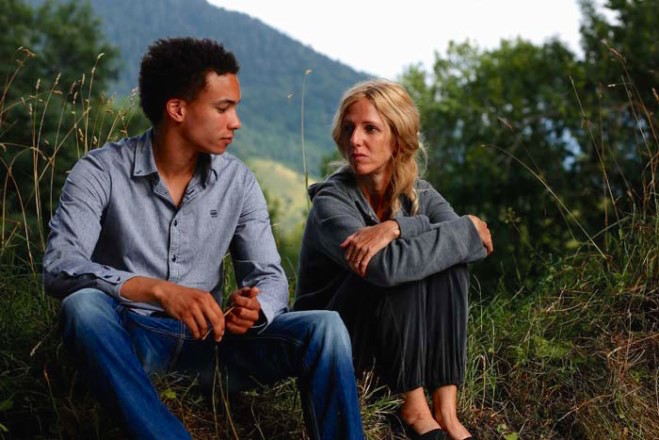
Amir Soltani is covering the Berlin International Film Festival, TFE's first time at Berlinale! Here are the two French films from the festival’s Competition section (the group of film's Meryl Streep & jury are seeing).
L’AVENIR (Mia Hansen-Løve)
Mia Hansen-Løve has established herself as one of world cinema’s most exciting young filmmakers in the past few years. Her latest, L’Avenir (Things to Come) came to Berlinale as one of the festival’s most anticipated films. Starring Isabelle Huppert as Nathalie, a middle-aged philosophy teacher on the verge of significant changes in her personal and professional life, L’Avenir is an intimate, life-affirming character study with a superb star turn from Huppert...

The serenity of Nathalie’s life seems to come apart at the seams all at once. Her publisher decides to cancel her long-standing book deal, her children have left to find their own paths and moved away, her chronically depressed mother needs Nathalie’s consistent care and her husband’s infidelity is about to come to light. In the face of this mess, Nathalie tries to find solace in teaching and in her acquaintance with a former student who has left the city to live deep in the mountains with a group of fellow young ‘revolutionaries.’
Huppert’s performance exhibits an unexpected level of warmth not generally associated with her characters. She delivers a masterwork of characterization, balancing with great tactility Nathalie’s melancholy concession to her life slipping through her fingers, with the gradual resurgence of joyous liberation. This is a relaxed, subtle performance where the most powerful effect is found in the smallest gestures.
Hansen-Løve’s direction is equally relaxed, toying with the audience’s expectations with sinuous camera movements and the unpredictably altering structures and lengths of scenes as the golden-hued mise-en-scène draws us in. L’Avenir can do without some of recitations of philosophy that intermittently take over the dialogue, but this is an otherwise significant step forward, formally and thematically, for the director.

BEING 17 (André Téchiné)
Téchiné has been an ever present figure on the European festival circuit, though the top prize has always eluded him. His latest film, Being 17 (Quand on a 17 ans) is unlikely to change that pattern at a festival where the talk has frequently revolved around female-dominated stories or those more immediately connected to global issues like immigration and the refugee crisis. Yet, to say that Téchiné’s work is comparatively light is no disrespect to the film itself, a droll and heartwarming foray into the friendship of two young teenage boys in rural France.
Damien (Kacey Mottet Klein) and Thomas (the strikingly handsome Corentin Fila) are high school classmates whose troubled relationship has led to many physical altercations. Damien is the son of a military pilot (who is away from France on a mission) and a doctor, Marianne (Sandrine Kiberlain). Thomas is the adopted son of farmers who live atop snowy mountains, from where he walks to school everyday for three hours. He is also biracial, a fact that the film quite cleverly never directly references, but implicitly draws on as a contributing factor to the boy’s confused sense of identity. With the news that his adoptive mother is pregnant after nearly two decades of trying, Thomas becomes more conflicted, his grades drop and his relationship with Damien fractures even deeper. But things take a turn when Marianne, invites Tomas to live at their house during his mother’s pregnancy, to be closer to school.
Being 17 deals with themes that are familiar to long-time observers of Téchiné’s work, as well as those of his co-writer, Céline Sciamma: the confusion and volatility of adolescence, and the evolution and fluidity of sexuality. The boys oscillate back and forth between animosity and attraction, a tension that the film treats with playfulness but without schmaltz. Although the process of falling in love and the treatment of Thomas as an object of desire – and as an aloof, brooding teenager – fall into cliché at times, the film is smart enough to utilize most of these tropes for comedic effect – one particular scene, in which rain suddenly starts pouring on the characters, is one of the year’s funniest moments. The result is an engaging film that depicts teenage romance with all the physicality, sensuality and fleeting energy that it entails.

Previous Reviews: Fire At Sea, Hedi and Midnight Special